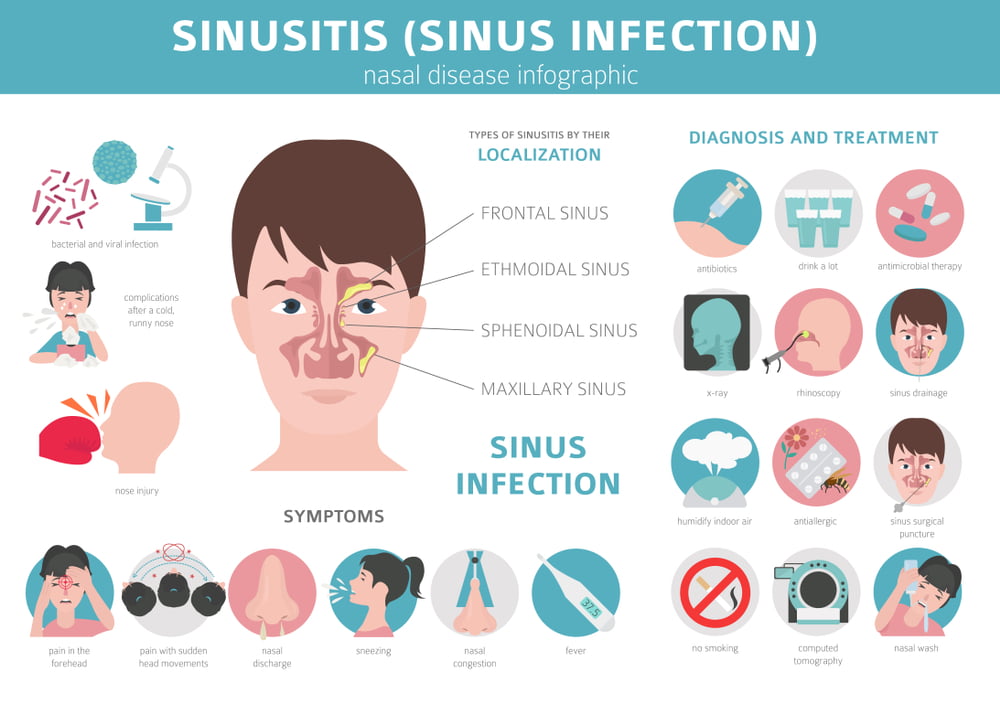How Long Does a Sinus Infection Last?
Sinus infections are a common condition that affects many people each year. Also known as sinusitis, this condition can cause various symptoms, including nasal congestion,…
Sinus infections are a common condition that affects many people each year. Also known as sinusitis, this condition can cause various symptoms, including nasal congestion, facial pain, and headaches. The answer may vary depending on several factors if you wonder how long a sinus infection lasts. This article will discuss the causes, symptoms, and treatment options for sinus infections, as well as how long they typically last.

Table of Contents
What is a sinus infection?
A sinus infection occurs when the tissues lining the sinuses become inflamed or infected. The sinuses are air-filled spaces located in the bones of the face and head, and they help to warm and moisten the air we breathe. When the sinuses become blocked or inflamed, it can cause mucus buildup and pressure in the sinus cavities, leading to symptoms of sinusitis.

There are several types of sinusitis, including acute, subacute, chronic, and recurrent. Acute sinusitis typically lasts up to four weeks, while subacute sinusitis lasts four to twelve weeks. Chronic sinusitis can last more than twelve weeks, while recurrent sinusitis is characterized by multiple episodes of acute sinusitis over a year.
Causes of sinus infections
Various factors, including viruses, bacteria, fungi, and allergies, can cause sinus infections. Most cases of acute sinusitis are caused by viral infections, which are typically self-limiting and will resolve on their own within a few weeks.
Bacterial infections are less common but can occur when a viral infection leads to inflammation and blockage of the sinuses, creating a favorable environment for bacterial growth. Fungal infections can also cause sinusitis, particularly in individuals with weakened immune systems or underlying medical conditions.
Allergies can also contribute to sinusitis by causing inflammation and congestion of the nasal passages, leading to mucus buildup and pressure in the sinuses. Other risk factors for sinusitis include smoking, exposure to air pollution, and structural abnormalities in the nasal passages or sinuses.
Symptoms of sinus infections
The symptoms of sinusitis can vary depending on the type and severity of the infection. Common symptoms of acute sinusitis include:
- Nasal congestion
- Facial pain or pressure
- Headache
- Thick, discolored nasal discharge
- Cough
- Fever
- Fatigue
In some cases, acute sinusitis can cause tooth pain, ear pain, or a sore throat. Subacute and chronic sinusitis may cause similar symptoms but may last longer or be less severe. In chronic sinusitis, symptoms may be present for over three months, including nasal obstruction, postnasal drip, loss of smell or taste, and chronic cough.
Diagnosis and treatment of sinus infections
To diagnose sinusitis, your healthcare provider will perform a physical exam and may order imaging tests or nasal swabs to check for bacterial or fungal infections. Treatment for sinusitis will depend on the underlying cause and severity of the disease.
Acute sinusitis caused by a viral infection typically resolves within two to four weeks. Treatment may include over-the-counter pain relievers, decongestants, and saline nasal sprays to alleviate symptoms. Antibiotics may be prescribed if a bacterial infection is suspected, but they are not typically needed for viral sinusitis.
Chronic sinusitis may require more aggressive treatment, including long-term antibiotic therapy, oral or nasal corticosteroids, and nasal irrigation or surgery to improve drainage and remove blockages. Allergy testing and immunotherapy may also be recommended for individuals with allergic sinusitis.
How long does a sinus infection last?
The duration of a sinus infection can vary depending on the type and severity of the infection, as well as the time of a sinus infection can vary depending on the type and severity of infection, as well as the underlying cause and individual factors. Acute sinusitis caused by a viral infection typically lasts up to four weeks, while subacute sinusitis lasts four to twelve weeks. Chronic sinusitis lasts more than twelve weeks and may require more aggressive treatment.
It is essential to seek medical attention if you are experiencing symptoms of sinusitis, as untreated or improperly treated infections can lead to complications such as the spread of the disease to other areas, meningitis, or brain abscess.

Conclusion
In conclusion, sinus infections can be caused by various factors and can lead to a range of symptoms. Treatment options depend on the underlying cause and severity of the infection, and the duration of the infection can vary. If you are experiencing symptoms of sinusitis, it is important to seek medical attention for proper diagnosis and treatment.
Related Article: Is sprite good for a sore throat?
References:
- American Academy of Otolaryngology-Head and Neck Surgery. Sinusitis. https://www.enthealth.org/conditions/sinusitis/. Accessed March 21, 2023.
- Centers for Disease Control and Prevention. Sinus Infection (Sinusitis). https://www.cdc.gov/antibiotic-use/community/for-patients/common-illnesses/sinus-infection.html. Accessed March 21, 2023.
- Mayo Clinic. Sinusitis. https://www.mayoclinic.org/diseases-conditions/sinusitis/symptoms-causes/syc-20377516. Accessed March 21, 2023.


